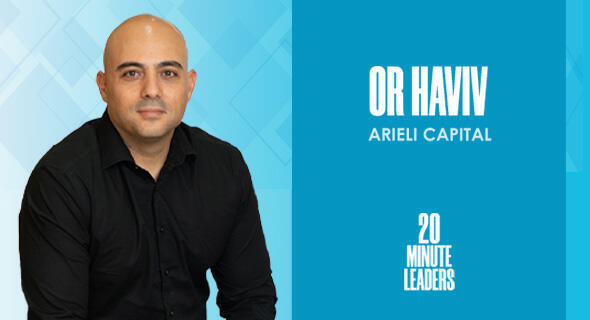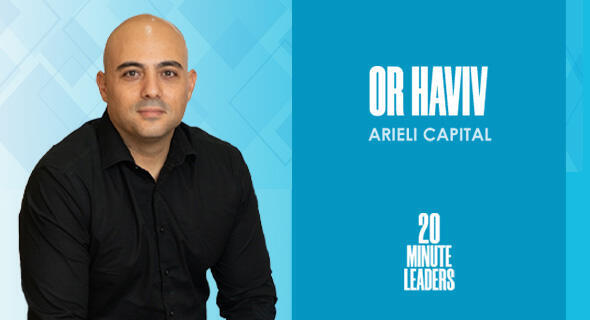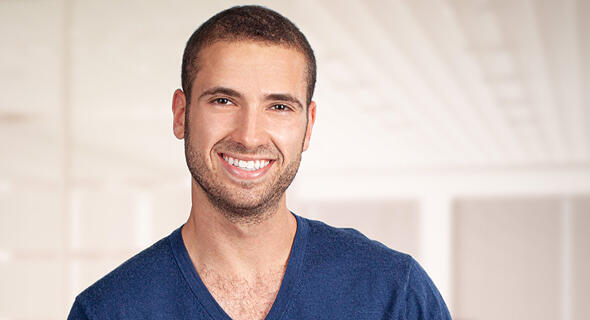
20-Minute Leaders
“Entrepreneurs should spend a lot of time thinking if they are in the right ecosystem.”
One aspect of startups that tends to get less attention is where they are located and the ecosystem around them, says Or Haviv, managing partner at Arieli Capital.
One aspect of startups that tends to get less attention is where they are located and the ecosystem around them, says Or Haviv, managing partner at Arieli Capital. He shares that the environment a startup is in has a big influence on its success, and it takes a village to help new businesses thrive. Entrepreneurs should give a lot of thought to the ecosystem they want to be in, Haviv advises, and investors should consider that factor when evaluating companies. Arieli is helping to create ecosystems, especially outside of Israel’s main tech hubs, to nurture startups with the firm’s holistic approach of providing assistance to companies and running incubators and accelerators. They recently launched a community focused on ocean tech so companies in the field can find support and investors. Haviv says he wants to make an impact on others by inspiring them to reach their potential.
I've been connected to the world of innovation pretty much since I was born. It's a passion that I have had since I was a little kid. Around 2000, I moved to Silicon Valley and I studied. We really got embedded into the different components of the digital ecosystem. It was very exciting to be in the Valley in those years and to see all these companies grow.
One of the first things that I took from it is the potential of a community. What is the role of an ecosystem in helping startups grow? There's a famous saying, "It takes a village to grow a child." Well, it takes a village to grow a startup. There are a lot of different components to a healthy ecosystem.
Talk to me a little bit about Eilat, where you’re building that ecosystem and village within the southernmost city of Israel.
The story of Eilat and of different places that Arieli operates in is really a story of building ecosystems and believing in people and doing our part in helping to realize human potential. Arieli is a holdings investment firm that was founded around 2016 in New York. The whole background of Arieli is really family offices-oriented, multi-generation investors in tech companies.
What drove Arieli to become a new age investment firm is its holistic atmosphere and overview. Arieli is not just an investment firm but also helps companies to grow, leads incubators, leads innovation centers, runs accelerators, works with academic institutions on academic commercialization, and provides digital services to companies for digital acceleration. All these different things provide us with the ability to look at and help companies grow. When you take all these things, it really brings our ability to help ecosystems grow.
I lived as a teenager in Eilat, so I have a warm spot in my heart for Eilat. We all know Eilat as a tourist destination. We saw the business potential. Arieli and Tech Center, which is our local company, built a community and we brought accelerators. We believe in the potential of Eilat and other things in the periphery of Israel.
We all know that most of Israel's high-tech scene is centered around Tel Aviv and Herzliya. But it's not sustainable. The country has a lot more to offer. Israel's periphery, north and south, offers a very big variety of assets for startups to use.
I'll give you an example in the Negev. One of the things Arieli has done is to partner with Ramat HaNegev, which is the largest regional council in the country. In the past 60 years, they’ve developed an R&D center focusing on agriculture bordering desert. That's very relevant for when we talk about the climate change that the world is experiencing today. One of the things that they've done is really to find a way to adapt certain breeds and certain crops to those changing climates.
We built Frontier, our innovation center focusing on a desert climate. Very soon, we'll be able to announce our incubator and investment fund that's focusing on agriculture.
If you're thinking through your experience in building villages and ecosystems, what is something that we may be overlooking the importance of or that we don't give enough attention to that is actually crucial in building a healthy ecosystem?
I was invited to speak on an investor panel, and one of the final questions was: what do you think is one of the key factors for investors when they look at companies?
I said, "When I look at companies, I also look at the team, the technology, the potential, the market, and all that stuff. But one of the things that I'm looking at is: where are they? Are they in a place where they have a healthy ecosystem that's going to help them grow?"
Being an investor in a tech scene is all about managing risks. One of the things that I think investors sometimes overlook is examining the ecosystem and its components, where the company is right now, or maybe it needs to move to a different one or develop a different one. That has a key factor in helping the company.
We all know (the importance of) being in the right place at the right time, with the access to the right services and assets and an ecosystem that is healthy also with investors that are relevant to your sector.
One of the things that Arieli is developing is an ecosystem focused on ocean technology. Maybe humanity started to take the oceans for granted. It's about 70 or more percent of our planet. It affects everything that we talk about, hear, and feel; our climate, life, food, and products. One of the things that Arieli has done with amazing partners, including Start-Up Nation Central, universities, research institutes, and investors, is build the first real community that deals with ocean tech-related innovations.
We had four events focused on key factors: the food from the sea; the water; the shipping, trade, and logistics; and climate change. At each event, we saw the demand because each event attracted hundreds of people from around the world.
We spoke with several Israeli startups that have amazing technologies for the shipping and logistics sector, and they said when they speak to investors, the investor says, "We want to help you, but we can't because we don't understand the industry." That's the importance of the ecosystem.
We’ve had startups that came to our community, and our community helped them to find their first programmers and the first co-founders and very basic things. These are tough questions of a startup in the early days: Where do I sit? How do I meet my co-founders? How do I meet my first programmers? These are all answered by a healthy ecosystem.
I recommend to young entrepreneurs, and investors too, to really look at the company but also spend a lot of time on thinking, not just about the right product for the right industry, but: are they in the right place for them, in the right ecosystem with the right components? Sometimes the right ecosystem for the startup is not necessarily Tel Aviv.
Where does all this passion and this excitement to build these ecosystems and support companies that are doing high impact technologies come from?
I grew up in a house of educators. My mom was a teacher, and some of her students literally said that my mom changed their lives and sent them on a different path. I joined the special forces in the military, and then I was in the secret service for a while. I saw different aspects of humanity. I realized that the most important natural asset is the human brain. Anybody that sees this podcast, you are the most valuable asset that this planet, maybe the universe, has ever had.
We're the only creature that I know of that can decide one morning that we want to land a probe on a different planet, and we can execute on it and make it happen. We have been given this unbelievable gift, which is the human brain and human potential. That's the driving force in everything that I do.
I promised myself a while ago that whatever I do, I want it to help humanity to realize human potential. In my small little impact, that's what I want to do. If I can impact somebody or some people, I think that's the greatest gift. One of the greatest things a person can achieve in their life is to inspire a different person.
Michael Matias, Forbes 30 Under 30, is the author of Age is Only an Int: Lessons I Learned as a Young Entrepreneur. He studies Artificial Intelligence at Stanford University, is a Venture Partner at J-Ventures and was an engineer at Hippo Insurance. Matias previously served as an officer in the 8200 unit. 20MinuteLeaders is a tech entrepreneurship interview series featuring one-on-one interviews with fascinating founders, innovators and thought leaders sharing their journeys and experiences.
Contributing editors: Michael Matias, Megan Ryan














